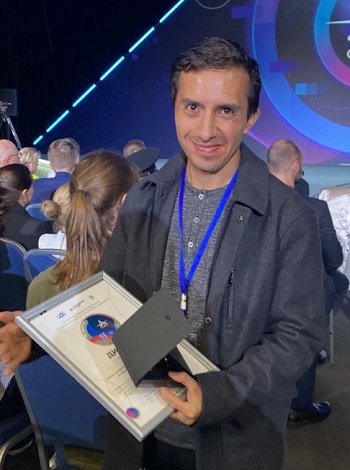RUDN postgraduate students from Ecuador and Mali win at the festival of scientific and technical creativity "Ot Vinta! (Off we go)"

Salazar Flores Christian Alexander
Project “The Problem of Water Quality Management in Tropical Climate Countries (on the Example of the Republic of Ecuador)”
About the project: what is its use and why did you choose this topic?
This topic is very relevant in most regions of the Republic of Ecuador, where sodium hypochlorite is used as a disinfectant for water disinfection. Combined with the high content of natural organic matter found in Andean waters, it forms carcinogenic by-products.
I investigated the water quality of a surface water source in a city located in the Andean tropical ecosystem of the Republic of Ecuador. I developed two scenarios, thanks to which it is possible to replace chlorine disinfection with ultraviolet disinfection of various intensity. This will help solve the problem of disinfection by-products during water treatment.
How will your project make the world a better place and help people?
The problem of supplying people with high-quality drinking water is a priority in ensuring the sanitary and epidemiological well-being of the population. Prevention of the incidence of water-related infections is associated with high-quality water treatment. However, disinfecting water with chlorine-containing reagents forms toxic by-products of disinfection that are hazardous to public health. Therefore, new technologies, such as ultraviolet disinfection, are increasingly being used in the water industry. Typically, the choice of the “best” water treatment system is based on economic and technical constraints. However, the water treatment industry may be responsible for significant global environmental impacts.
In my project, in addition to preventing the formation of unwanted by-products during water chlorination, I analyzed the most environmentally friendly technologies. They enable cleaner and more sustainable processes that guarantee a better quality of life for the final product consumers.
Why did you start doing science and what is your “scientific” dream?
Since childhood, I have always been interested in understanding the causes of the phenomena that surrounded me. Parents encouraged my interest in scientific topics. Sometimes my father took me to work, where he showed me how to prepare samples for examination under a microscope. My mother used to tell me: “The kitchen is a great laboratory.” When we cooked together, we mixed household substances, made solutions and observed the solubility of different products.
The desire to do science got stronger as I continued my studies. My main mentor in the scientific field has been Anna Kurbatova, my PhD supervisor. It was she who advised me not to be afraid to participate in conferences, strive for self-education, do my own scientific research, write articles and make presentations.
.jpg)
Diakite Simbo
Project “Development of Technologies for Protection Against Diseases of New Varieties of Wheat for Cultivation in Hot Climate Countries and Regions”
"Wheat is the staple food of millions of people in Africa. Africa as a whole, as well as individual African countries, cannot provide themselves with wheat. One of the main reasons is the sharp rise in prices. Mali’s annual wheat consumption exceeds 200,000 tons, of which about 70% is imported.
Reasons for the low yield and grain quality of wheat in Mali:
- poor development of agricultural mechanization;
- lack of quality seeds;
- high prices for agriculture production means;
- lack of subsidies and high contamination of crops;
- mass damage by various phytopathogenic organisms.
One of the ways to increase yields is to select high-yielding varieties with increased resistance to pathogens and develop cultivation technologies adapted for these varieties.
My goal is to develop disease protection technologies for new varieties of wheat that are suitable for growing in Mali. The introduction of Russian high-quality spring wheat varieties and the use of Russian pesticides can be a promising way for my country and Africa as a whole. This minimizes dependence on imports".
The RUDN Prize for Scientific Achievements in Chemistry for 2025, with a monetary award of 2 million rubles, was awarded to Alexander Davidovich Dilman, Deputy Director of the N.D. Zelinsky Institute of Organic Chemistry of the Russian Academy of Sciences. The researcher received the award during the celebration marking RUDN’s 66th anniversary.
Sergey Ivanov, a scholar from St. Petersburg, has been named the first winner of RUDN University’s International Prize for Scientific Achievements in Mathematics, worth 5 million rubles.
Products derived from microalgae represent a cutting-edge development in the field of bioeconomy. The potential of this biological resource was discussed at the international research seminar “Foundations for a Green Sustainable Energy”, part of the BRICS Network University’s thematic group on “Energy”. The event was organized by the Institute of Ecology at RUDN University.


